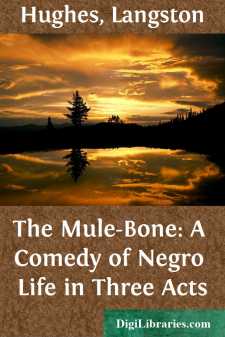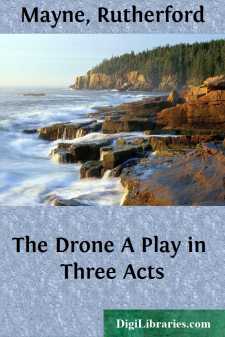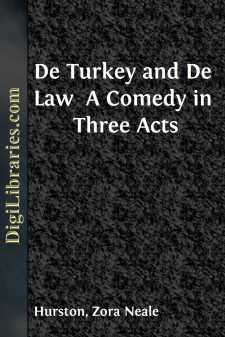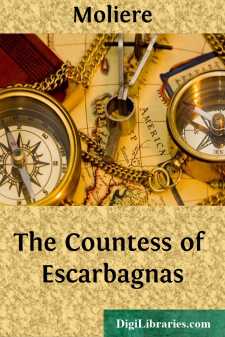Drama Books
Sort by:
ACT I. — THE SECRET. Scene:—The exterior of a decayed, weatherbeaten, Elizabethan 'mansion, overgrown with ivy and autumn-tinted creeper. On the R., the lower part of a tower, square or circular. Facing the audience, about five feet from the ground, a door opening into the tower, the entrance proper to the house. This door leads out on to a stone terrace, which is run off the stage R., and...
more...
by:
Langston Hughes
CHARACTERS JIM WESTON: Guitarist, Methodist, slightly arrogant, agressive, somewhat self-important, ready with his tongue. DAVE CARTER: Dancer, Baptist, soft, happy-go-lucky character, slightly dumb and unable to talk rapidly and wittily. DAISY TAYLOR: Methodist, domestic servant, plump, dark and sexy, self-conscious of clothes and appeal, fickle. JOE CLARK: The Mayor, storekeeper and postmaster,...
more...
A PROLOGUE TO BE SPOKEN BY BETSY Our scene is the wind-swept coast of Devon. By day there is a wide stretch of ocean far below, and the abutments of our stage arise from a dizzy cliff. The time is remote, and ships of forgotten build stand out from Bristol in full sail for the mines of India. But we must be loose and free of precise date lest our plot be shamed by broken fact. A thousand years are but...
more...
by:
Rutherford Mayne
The Drone A COMEDY IN THREE ACTS ACT I. Scene: The farm kitchen of John Murray. It is large and spacious, with a wide open fire-place to the right. At the back is one door leading to the parlour and other rooms in the house, also a large window overlooking the yard outside. To the left of this window is the door leading into the yard, and near the door an old-fashioned grandfather's clock....
more...
CAST Jim Weston A young man and the town bully (A Methodist) Dave Carter The town's best hunter and fisherman (Baptist) Joe Clarke The Mayor, Postmaster, storekeeper Daisy Blunt The town vamp Lum Boger The Marshall Walter Thomas A villager (Methodist) Lige Moseley A villager (Methodist) Joe Lindsay A villager (Baptist) Della Lewis A villager (Baptist) Tod Hambo A villager (Baptist) Lucy Taylor A...
more...
THE CHARACTERS GODS:MADANA (Eros).VASANTA (Lycoris). MORTALS:CHITRA, daughter of the King of Manipur.ARJUNA, a prince of the house of the Kurus. He is of theKshatriya or "warrior caste," and during the action is living asa Hermit retired in the forest. VILLAGERS from an outlying district of Manipur. NOTE.—The dramatic poem "Chitra" has been performed in Indiawithout scenery—the...
more...
by:
Oscar Wilde
PROLOGUE. Scene.—A Russian Inn. Large door opening on snowy landscape at back of stage. Peter Sabouroff and Michael. Peter (warming his hands at a stove). Has Vera not come back yet, Michael? Mich. No, Father Peter, not yet; 'tis a good three miles to the post office, and she has to milk the cows besides, and that dun one is a rare plaguey creature for a wench to handle. Peter. Why didn't...
more...
INTRODUCTION TO SARDANAPALUS Byron's passion or infatuation for the regular drama lasted a little over a year. Marino Faliero, Sardanapalus, and the Two Foscari, were the fruits of his "self-denying ordinance to dramatize, like the Greeks ... striking passages of history" (letter to Murray, July 14, 1821, Letters, 1901, v. 323). The mood was destined to pass, but for a while the neophyte...
more...
by:
Bronson Howard
BRONSON HOWARD (1842-1908) The present Editor has just read through some of the vivacious correspondence of Bronson Howard—a sheaf of letters sent by him to Brander Matthews during a long intercourse. The time thus spent brings sharply to mind the salient qualities of the man—his nobility of character, his soundness of mind, his graciousness of manner, and his thorough understanding of the dramatic...
more...
by:
Moliere
SCENE I.—JULIA, THE VISCOUNT. Visc. What! you are here already? Ju. Yes, and you ought to be ashamed of yourself, Cléante; it is not right for a lover to be the last to come to the rendezvous. Visc. I should have been here long ago if there were no importunate people in the world. I was stopped on my way by an old bore of rank, who asked me news of the court, merely to be able himself to detail to...
more...











